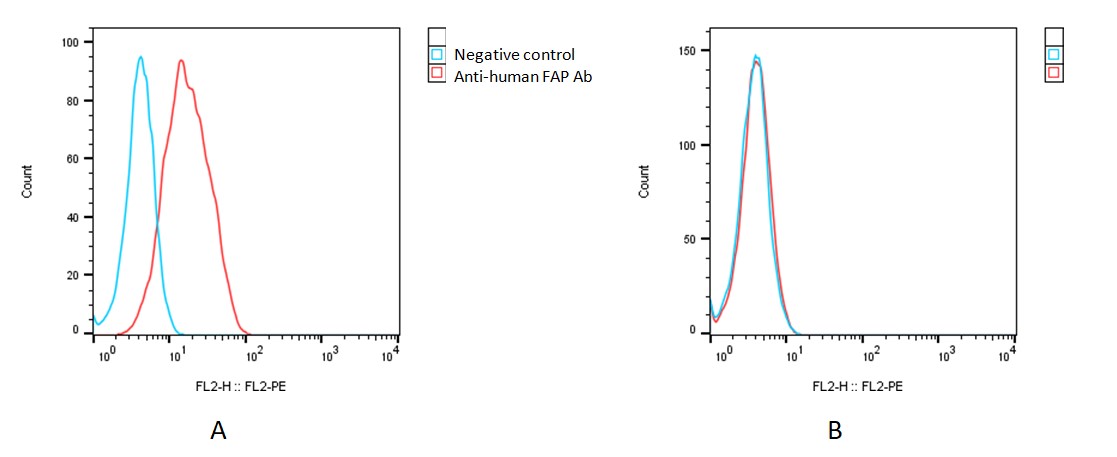
| Catalog Number | Product | Size | Price | |
|---|---|---|---|---|
| C3093 | Human FAP-CHO-K1 stable cell line | 2 vials | $4950 | Order |
| Catalog Number | C3093 |
|---|---|
| Cell Line Name | Human FAP-CHO-K1 stable cell line |
| Accession Number | NM_004460.5 |
| Host Cell | Adherent CHO-K1 |
| Quantity | Two vials of frozen cells (2x106 per vial) |
| Culture Medium | DMEM with 10% FBS, 4 ug/ml puromycin |
| Freezing Medium | 90% FBS and 10% DMSO |
| Storage | Liquid nitrogen upon receipt |
| Product Datasheet: | Download PDF |
Detection of human FAP expression on human FAP-CHO-K1 stable cells (A) and Vector Control-CHO-K1 cells (B) using a monoclonal antibody specific for human FAP (Invitrogen #BMS168), followed by staining with PE-anti mouse antibody.

Fibroblast Activation Protein (FAP) is a type II integral membrane glycoprotein and a member of the serine protease family. FAP plays a critical role in tissue remodeling, wound healing, and fibrosis due to its ability to degrade components of the extracellular matrix (ECM), such as gelatin and type I collagen. FAP is transiently expressed by activated fibroblasts in normal tissues during wound healing and inflammation. FAP is expressed at low or undetectable levels in most adult tissues. It is mainly upregulated in situations of tissue injury and fibrosis, where fibroblasts are activated. FAP is highly expressed in cancer-associated fibroblasts (CAFs), where it contributes to the remodeling of the tumor stroma, promoting tumor growth, invasion, and metastasis. The expression of FAP is restricted to the tumor stroma, particularly in cancer-associated fibroblasts (CAFs), and is rarely found in the tumor cells themselves. Its presence is associated with poor prognosis, enhanced tumor aggressiveness, and immune evasion, as FAP plays a role in modulating the tumor microenvironment (TME). Given its limited expression in normal tissues and its strong association with tumor stroma, FAP is an attractive therapeutic target including strategies like FAP-targeted antibodies, small molecule inhibitors, and FAP-specific immunotherapies.
Wu Y, Wu C, Shi T, et al. FAP expression in adipose tissue macrophages promotes obesity and metabolic inflammation. Proc Natl Acad Sci U S A. 120(51):e2303075120. 2023.
Cai J, Yang D, Sun H, et al. A multifactorial analysis of FAP to regulate gastrointestinal cancers progression. Front Immunol. 14:1183440. 2023.